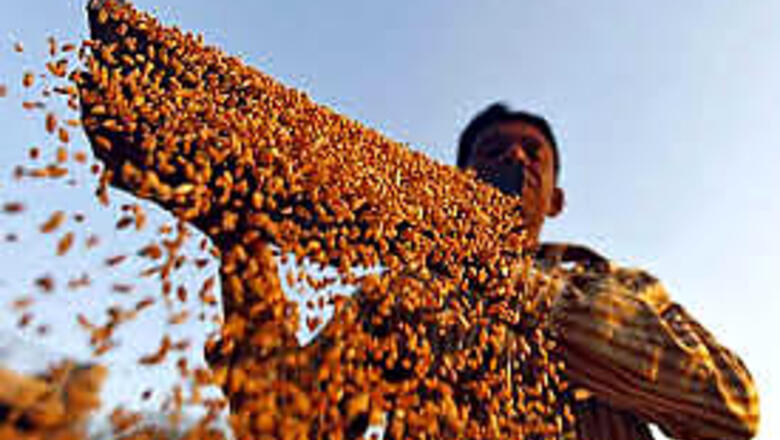
views
New Delhi: The government has raised the price it will pay to buy new-season wheat from local farmers by 3.57 per cent to 1,450 rupees per 100 kg, encouraging the crop even though supply has exceeded demand for eight years.
India, the world's second-biggest wheat consumer, sets a price each year to protect domestic farmers from distress sales and to cover emergency needs. It uses the grain to sell food to the poor at low prices.
The government announced this year's increase in a statement on Wednesday.
It also raised the support price for new-season rapeseed, the main winter-sown oilseed, to 3,100 rupees per 100 kg from 3,050 rupees a year earlier.
State governments buy oilseeds only when prices fall below the support rate and can claim reimbursements from the central government.
Imports account for nearly 60 per cent of India's annual edible oil demand of 18-19 million tonnes, making it the world's biggest buyer.
STORAGE OVERFLOWING
In the grain market, India's bins are overflowing after a sharp rise in the support price in the past decade. The government has allowed exports from its warehouses in the past two years, in a reversal from 2006, when India had to buy expensive Australian wheat.
On October 1, wheat stocks at government warehouses amounted to 32.3 million tonnes, nearly three times the official target.
Indian farmers grow only one wheat crop a year, with planting in October-November and harvesting from April. This year, farmers harvested a record 95.9 million tonnes of wheat, up from 92.5 million the previous year.
Higher support prices for farmers, large inventories and exports have led to a rising subsidy bill and invited criticism at the World Trade Organization (WTO).
Seeking more freedom to subsidise and stockpile grains, India in July blocked a global trade reform at WTO.
While India refuses to yield in the WTO spat, the chairman of EU trade ministers on October 15 said New Delhi has until October 21 to support a global trade deal struck last year or risk being left out of the agreement to ease worldwide customs rules.
Presenting his first budget for the fiscal year to March 2015, Finance Minister Arun Jaitley on July 10 earmarked 1.15 trillion rupees for food subsidies.
State governments are also in the process of rolling out the $19 billion Food Security Act, which promises cheap rice and wheat to 810 million people, expanding current handouts made to 318 million of India's poorest people.




















Comments
0 comment